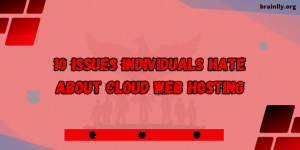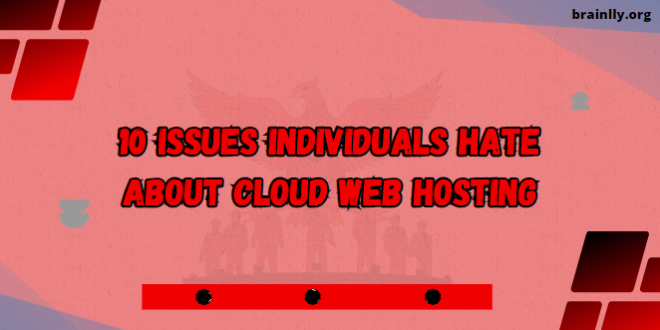Cloud web hosting has gained significant popularity in recent years due to its numerous benefits. However, like any other technology, it has its downsides that can frustrate users. In this article, we will discuss ten common issues that individuals often dislike about cloud web hosting.
1. Downtime
One of the major concerns with cloud web hosting is occasional downtime. Although providers strive for high uptime, technical glitches, maintenance, or server failures can lead to website unavailability, resulting in lost opportunities and customer dissatisfaction.
2. Security Risks

While cloud hosting providers take security measures seriously, some individuals worry about the potential risks associated with storing their data in the cloud. Concerns over data breaches, unauthorized access, and lack of control over security protocols can make users hesitant to embrace cloud hosting fully.
3. Limited Control
Cloud web hosting often requires users to rely on the provider for managing server infrastructure. This lack of control can be frustrating for individuals who prefer to have full control over their hosting environment, including software configurations and server optimizations.
4. Cost Management
Cloud hosting offers scalability and flexibility, but it can also result in unexpected costs. As usage increases, individuals may face challenges in predicting and managing their hosting expenses, leading to budgetary concerns and financial strain.
5. Data Loss Risks
Although cloud providers implement robust data backup mechanisms, there is always a possibility of data loss. This risk can be worrisome for individuals who store critical data on cloud servers and rely heavily on the availability and integrity of their information.
6. Performance Variability
Cloud hosting performance can fluctuate due to various factors such as shared resources, network congestion, or hardware issues. This variability can impact website speed and responsiveness, potentially leading to a negative user experience.
7. Vendor Lock-In
Some individuals dislike the idea of being tied to a specific cloud hosting provider. Once they invest time and effort into setting up their infrastructure, switching providers can be challenging and time-consuming, leading to a sense of dependency and limited flexibility.
8. Technical Complexity
Cloud web hosting involves managing complex technologies, configurations, and integration with other services. This technical complexity can be overwhelming for individuals with limited technical expertise, making it difficult for them to utilize the full potential of cloud hosting.
9. Lack of Personalized Support
Cloud hosting providers often offer technical support, but some individuals feel that the support can be impersonal or slow. They may prefer more personalized assistance or quicker response times, especially when facing critical issues or downtime.
10. Regulatory Compliance
For individuals operating in industries with strict regulatory requirements, ensuring compliance while using cloud hosting can be a challenge. Concerns about data sovereignty, privacy, and adherence to industry-specific regulations can make it difficult for some users to fully embrace cloud web hosting.
Conclusion
While cloud web hosting has revolutionized the way websites and applications are hosted, it is not without its downsides. Issues such as downtime, security risks, limited control, and cost management can frustrate individuals. However, with careful consideration and proper planning, these challenges can be mitigated, allowing users to leverage the benefits of cloud hosting effectively. By understanding these issues and working closely with reliable providers, individuals can make informed decisions to ensure a smooth hosting experience.
Thank you for reading this article, and we look forward to sharing more interesting content with you in the future. Until next time!
 Brainlly A collection of the latest news and information from various trusted sources
Brainlly A collection of the latest news and information from various trusted sources
